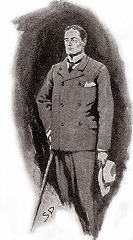OUR breakfast table was cleared early, and Holmes waited in his dressing-gown for the promised interview. Our clients were punctual to their appointment, for the clock had just struck ten when Dr. Mortimer was shown up, followed by the young baronet. The latter was a small, alert, dark-eyed man about thirty years of age, very sturdily built, with thick black eyebrows and a strong, pugnacious face. He wore a ruddy-tinted tweed suit and had the weather-beaten appearance of one who has spent most of his time in the open air, and yet there was something in his steady eye and the quiet assurance of his bearing which indicated the gentleman.

“This is Sir Henry Baskerville,” said Dr. Mortimer.
“Why, yes,” said he, “and the strange thing is, Mr. Sherlock Holmes, that if my friend here had not proposed coming round to you this morning I should have come on my own account. I understand that you think out little puzzles, and I’ve had one this morning which wants more thinking out than I am able to give it.”
“Pray take a seat, Sir Henry. Do I understand you to say that you have yourself had some remarkable experience since you arrived in London?”
“Nothing of much importance, Mr. Holmes. Only a joke, as like as not. It was this letter, if you can call it a letter, which reached me this morning.”
He laid an envelope upon the table, and we all bent over it. It was of common quality, grayish in colour. The address, “Sir Henry Baskerville, Northumberland Hotel,” was printed in rough characters; the post-mark “Charing Cross,” and the date of posting the preceding evening.
“Who knew that you were going to the Northumberland Hotel?” asked Holmes, glancing keenly across at our visitor.
“No one could have known. We only decided after I met Dr. Mortimer.”
“But Dr. Mortimer was no doubt already stopping there?”
“No, I had been staying with a friend,” said the doctor. “There was no possible indication that we intended to go to this hotel.”
“Hum! Someone seems to be very deeply interested in your movements.” Out of the envelope he took a half-sheet of foolscap paper folded into four. This he opened and spread flat upon the table. Across the middle of it a single sentence had been formed by the expedient of pasting printed words upon it. It ran:
As you value your life or your reason keep away from the moor.
The word “moor”only was printed in ink.
“Now,” said Sir Henry Baskerville, “perhaps you will tell me, Mr. Holmes, what in thunder is the meaning of that, and who it is that takes so much interest in my affairs?”
“What do you make of it, Dr. Mortimer? You must allow that there is nothing supernatural about this, at any rate?”
“No, sir, but it might very well come from someone who was convinced that the business is supernatural.”
“What business?” asked Sir Henry sharply. “It seems to me that all you gentlemen know a great deal more than I do about my own affairs.”
“You shall share our knowledge before you leave this room, Sir Henry. I promise you that,” said Sherlock Holmes. “We will confine ourselves for the present with your permission to this very interesting document, which must have been put together and posted yesterday evening. Have you yesterday’s Times, Watson?”
“It is here in the corner.”
“Might I trouble you for it - the inside page, please, with the leading articles?” He glanced swiftly over it, running his eyes up and down the columns. “Capital article this on free trade. Permit me to give you an extract from it.